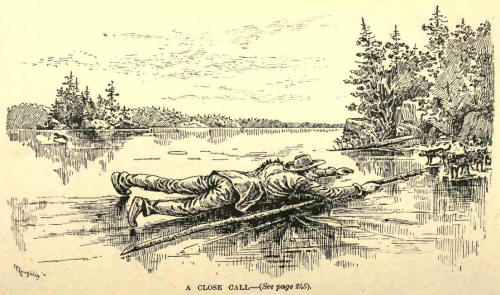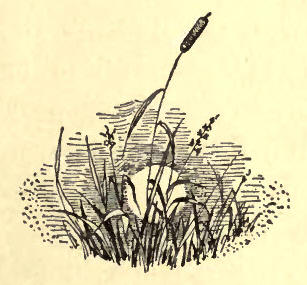|
ALL of a sudden the lake
froze over, and our nets were under, and we had no rope to pass under the
ice. So, leaving my gun with Neils, for he had none, and whistling the dogs
to me, I set out on a run for home; and as it was only twenty-five miles, my
purpose was to be back in camp the same night, for I could conveniently make
a fifty-mile run in those days. Down the valley and over the hills, through
the dense forest we went—the ten dogs and myself. Presently, as we were
coasting along the shore of a lake, we met a huge, gaunt timber wolf. Ali,
thought I, if I only had my gun! I set the dogs on him, but he very soon
drove them back, and came at me. I remembered seeing some lodge-poles a
little way back on the trail, and I retreated to them, and securing one,
came on to the attack again. Between the dogs and myself, we drove the wolf
on to a little point jutting out into the lake, and he took to the ice. I
foolishly followed him out, hoping to get a whack at him with my pole, but
suddenly I awoke to the fact that the ice was giving way with me and the
water was deep. Down I dropped, and stretched out, and leaned with the most
of my weight on the pole, which, covering a good space of ice, fortunately
held me up; so crawling and pushing, and anxiously looking through the
transparent ice for the bottom, I made for the shore. How thankful I was
when I did see the bottom, and presently was ashore once more!
As I ran off on the trail, I
seemed to take a fresh lease of life, for it seemed as if I had nearly lost
my grip of it a few minutes since.
I reached Mr. Woolsey's just
as he was sitting down to lunch, and he was so glad to see me that he would
not hear of my going back that afternoon.

A few Indians had come and
gone, and from these Mr. Woolsey had secured some dried meat, which to me
was a great treat after so much fish.
We were becoming fast
friends, this old bachelor missionary and myself, for while he was anything
but a pioneer, and altogether out of place in this wild country, yet he was
thoroughly good, and as full of the milk of "human kindness" as men are ever
made.
Early the next morning I was
away with the rope, and by night Neils and I had overhauled several of our
nets and put some fresh ones in their place.
And now winter set in, with
no snow, but extreme cold, which soon thickened the ice, and Neils and I
gave our spare time to making a couple of toboggans, for we purposed when we
did go home, to take loads of fish with us.
As the ice made, the fish
went away, and soon our fishing was over for that time. We had put up about
three thousand, and lived almost entirely on fish; the livers of some
dog-fish we occasionally caught being our only change, except a very few
fish-ducks, which were hardly a change. We had also fattened the ten dogs
ready for winter work. This was no small item.
Now we made a strong "log
cache," and stored our fish in it, putting tent and nets and everything with
the fish; and having finished our dog-sleighs, or toboggans, we contemplated
starting in the morning for home, though there was as yet no snow. As it was
moonlight, I proposed to Neils that we start at once.
So we loaded up, hitched our
dogs and set out. What a time we had—bare ground, fallen timber, stumps and
hills; and, to make matters worse, while we were making a fire about
midnight to cook our last duck, which we had saved for days for this very
purpose, the dogs stole it, and our disappointment was bitter. We had
cleaned that duck, and had it all ready to cook, and looked forward to
picking its bones ourselves. We craved the change in diet, even if it was
only from fish to a fishy duck; but just as we had the prize, the
contemptible dogs stole it, and though it is now thirty-two years since this
happened, I can still very strongly sympathize with Neils and myself.
We thawed and roasted a fish,
and started on, and about two o'clock in the morning came upon a solitary
lodge right on the road. This proved to be a wood Stoney, Peter Pe-kah-ches.
He and his family were starving. There was no snow, and everything being
crisp with frost, he could not approach game. Peter was a renowned hunter,
but the season was against him, and thus he was starving. We gave him part
of our fish, and received the heart-felt blessings of the whole family, who
hardly waited to thaw some of the fish until they ate them.
This lightened our hearts and
our loads also, and we went on and reached home before day- light.

|
